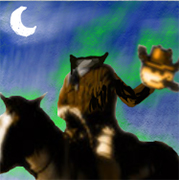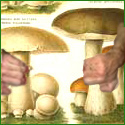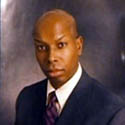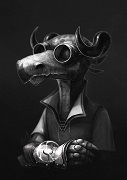|
Lucas Archer posted:Has this been posted? For a bit, Dalamar was the "official" DL wizard and would hang out with Mordenkainen and Elminster at the latter's secret space hideaway. I don't think you need to worry about Fizban's voice overwhelming the book, though. All the named hosts of these books generally just show up in sidebars to add a little color and humor. Towards that end, the forgetful wizard who's really a god in disguise is probably a solid choice.
|
|
|
|

|
| # ? Jun 4, 2024 22:13 |
|
Give me the Astinus book. Just tables and maths, no fluff.
|
|
|
|
Poil posted:I have been mildly annoyed at how for example if you're playing a monk that's going into kensei with a longsword where you either have to lug around one for two levels that you can't use at all or you'll go buy one at level 3 which you can suddenly use perfectly. Sure you can roleplay that you train with it during downtime but despite all those hours you're still not any better at it than the party wizard.
|
|
|
|
Fritzler posted:I'm doing first time 5E in Curse of Stahd. I think my character is going to be a battle smith artificer. He is going to claim to be from an organization of monster hunters (somewhere between witchers/belmonts), but then it just turns out he is only supposed to be an armorer/support staff and not actually good at fighting. That is my justification for spending all of his starting gold on a hand crossbow he has no proficiency with. Check with your GM that this fits the table you are playing at because some folks aren't going to love it
|
|
|
|
Mendrian posted:I think the only thing that matters for a character is consistency. If I bought into the idea that all D&D classes are perfect mechanical analogs of their story-based counterparts - e.g. the rules for the class 'wizard' felt appropriately wizard-y - I could see an argument against multiclassing without a reason. But that's just not the case in 5e. I think that's all pretty fair. Though I would want to clarify that this sort of thing is an opportunity for role-playing and character-building, not an obligation. As long as a character meets the mechanical requirements for multiclassing, then a player should be free to play the character however they'd like. Maybe the Paladin adding a level in Warlock represents a shift in their beliefs, maybe it's just another aspect of their deity. I wouldn't worry about it too much, any more than a Wizard taking a level in Sorcerer or a Fighter taking a level in Ranger. Now if I was playing as this character I would definitely come up with an elaborate reason why, but I'm not going to expect everyone else is going to do that. Toshimo posted:Check with your GM that this fits the table you are playing at because some folks aren't going to love it Why? People can buy whatever they want. They could even use the hand crossbow without proficiency in it if they want to, they just wouldn't get the proficiency bonus when doing so. As long as the character concept isn't "Useless at physical combat ... or anything else!" then I really wouldn't see an issue. Kaal fucked around with this message at 20:58 on Jul 16, 2021 |
|
|
|
Kaal posted:Why? People can buy whatever they want. They could even use the hand crossbow without proficiency in it if they want to, they just wouldn't get the proficiency bonus when doing so. Fritzler fucked around with this message at 21:08 on Jul 16, 2021 |
|
|
|
Fritzler posted:Yeah, I don't get that either (but don't want to annoy people). I will have fire bolt anyways at level 1, and at level 3 I will get the proficiency bonus to use it (with INT anyways). Yeah see that seems totally kosher to me. If you wanted you could even mention that you spend some of your long rests "tinkering" with your hand crossbow invention trying to get it just right. But I frankly can't imagine what problems there might be, provided you have the starting gold to purchase it.
|
|
|
|
Mendrian posted:I think the only thing that matters for a character is consistency. If I bought into the idea that all D&D classes are perfect mechanical analogs of their story-based counterparts - e.g. the rules for the class 'wizard' felt appropriately wizard-y - I could see an argument against multiclassing without a reason. But that's just not the case in 5e. This is a great answer, and I think it also really depends on the table you play with. I think we all in this thread live that life, but it's good to say sometimes for new people. Some tables and DMs are going to push more of the RP stuff. Some of them are going to be min max battles and characters and always push those limits. Some of them fall anywhere in between and all over. Also don't be afraid to admit when you don't fit with a table or DM. Sometimes poo poo just doesn't work out. Find people that fit your style and enjoy things.
|
|
|
|
I've had a couple of players who thankfully were just in one-shots or left after a couple of games who, if given that character concept, absolutely would make a scene about how useless they were in combat. Just terrible, wacky, spotlight-stealing stuff at a time when they could actually be doing something useful, like the other players. Like instead of using firebolt, they'd ineffectively fire the crossbow a couple of times and then spend a few turns with their character trying to unjam it or sitting on the ground to restring it or something. All while comically yelling about it breaking or whatever. I guess it's okay if you just plan on using firebolt instead, and what else are you even going to spend money on, but is there even a situation (aside from damage resistances I guess) where the hand crossbow would be a better choice thna firebolt?
|
|
|
|
BattleMaster posted:I guess it's okay if you just plan on using firebolt instead, and what else are you even going to spend money on, but is there even a situation (aside from damage resistances I guess) where the hand crossbow would be a better choice thna firebolt? I understand not wanting to be completely useless in combat, and will strive to make sure I am not. I was just trying to tell someone who carried a sword around for two levels as a Kensei monk before they can use it, what I was trying to do about carrying a crossbow for two levels until I got proficiency.
|
|
|
BattleMaster posted:I guess it's okay if you just plan on using firebolt instead, and what else are you even going to spend money on, but is there even a situation (aside from damage resistances I guess) where the hand crossbow would be a better choice thna firebolt?
|
|
|
|
|
BattleMaster posted:I guess it's okay if you just plan on using firebolt instead, and what else are you even going to spend money on, but is there even a situation (aside from damage resistances I guess) where the hand crossbow would be a better choice thna firebolt? I mean some players are definitely going to squeeze this sort of "hapless hero" joke for all that it's worth, but that's more of a role-playing issue than anything inherent. With 16 INT a Firebolt at level 3 would have an attack of +5 and deal 1d10 damage, whereas an infused Hand Crossbow would have an attack of +6 and deal 1d6 + 4 damage, and could fire twice with Crossbow Expert. And at level 5 the crossbow could fire three times at +7 for a total of 3d6 + 15, whereas the Firebolt would be one attack at +6 for 2d10. Kaal fucked around with this message at 21:45 on Jul 16, 2021 |
|
|
|
My low level artificer would occasionally use his light crossbow instead of firebolt because of range issues. Firebolt is a range of 120 but light xbow is 320.
|
|
|
|
do not actually care about pure optimization, unless literally everyone else at your table are building optimized gods.
|
|
|
|
Dexo posted:do not actually care about pure optimization, unless literally everyone else at your table are building optimized gods. There's a difference between optimization and players who conspicuously undermine the party's combat effectiveness as a character trait or gag. The latter isn't happening here after all but it's a real risk I've experienced a few times myself.
|
|
|
|
There's a small but persistent population of players who strictly want their character to be bad at everything. I think it's an expression of self-consciousness at playing tabletop games and a desire to not be a tedious Mary Sue, but it's definitely something to be nipped in the bud early on. You can play a comical character who occasionally makes RP-appropriate but non-optimal decisions without just being a deadweight gag factory. I was GMing a game in another system and a friend (who hadn't really played tabletops before) wanted to be bad at all of his skills and I just had to say that the system didn't accommodate that, and he had to be good at something to play at the table. It ended up being fine, but I've always been a little baffled by that type of player.
|
|
|
|
|
Some people want to play Rincewind without realizing that there's plenty of stuff he's good at.
|
|
|
|
|
Rolling my Mr. Magoo character now who succeeds at everything in spite of himself.
|
|
|
|
Kenning posted:There's a small but persistent population of players who strictly want their character to be bad at everything. I think it's an expression of self-consciousness at playing tabletop games and a desire to not be a tedious Mary Sue, but it's definitely something to be nipped in the bud early on. You can play a comical character who occasionally makes RP-appropriate but non-optimal decisions without just being a deadweight gag factory. What I've found is that this is related to a fear of failure - "If I try hard and gently caress up everyone will be mad at me, so I'll deliberately be bad so no one expects anything." It takes some people a while to get past that and accept that bad die rolls and dumb decisions are all part of the fun.
|
|
|
|
Yeah intentionally tanking a character is bad, but being like -1 of where you "should" be until your subclass/feats come online is whatever.
|
|
|
|
After some delay, I'm back to working on my 5e setting conversions for my Spheres of Power & Might project. Now without further ado...   Spheres of Siberys: the Spheres System for Eberron A world shaped by the prophecies and marks of dragons, where magic is omnipresent and uplifted the world into a new Industrial Revolution...and a terrible continental war. Major Traditions: Designed to incorporate a wide variety of material, just about every martial and casting tradition has its place in Eberron. Traditions that derive their power from “higher-technology” influences are usually some kind of magitech: devices powered by dragonshards, dragonmarked magic, the minor crafts of magewrights, or any combination of the three. Advanced/Legendary Talents: Eberron is a lower-powered world than typical D&D settings, where by the middle levels PCs number among some of the most talented people in major nations. But the setting’s high magic nature also means that a wide variety of spells are more commonplace here than in other settings. Generally speaking, talents without a level-based prerequisite or can be taken at 5th level are commonplace. Ones with a prerequisite of 11th level or higher represent precious lore wrought from the Dragonmarked House’s greatest visionaries, lost arts of Xen’drik and fallen civilizations, and secret techniques in the hands of the setting’s great powers such as the dragons of Argonnessen. Technology Level: Thanks to the proliferation of magic and dragonshards, many inventions of the mid 1800s to early 1900s have supernatural counterparts in Eberron, from the lightning rails linking far-flung nations to the telephone-style speaking stones. Firearms are even present thanks to the Artillerist Artificer subclass, although they are reflavored into specialized magic wands. Renaissance and Modern era talents can be taken and reflavored as magical devices without too much trouble.  New Rules & Subsystems Note: In addition to the official Rising from the Last War sourcebook, I’m also drawing influence from Keith Baker’s Morgrave Miscellany and Exploring Eberron sourcebooks. Both of the latter books can be found on the Dungeon Master’s Guild. Dragonmarks: Found only among the “major races” and among Khorvaire’s captains of industry, dragonmarks manifest as tattoo-like patterns on the flesh which grant limited magical powers keyed to a certain theme. Rules-wise dragonmarks can be used much like they are in Rising from the Last War, as variant sub-races. But in lieu of gaining bonus spells from their Spells of the Mark ability, they gain bonus talents from a single sphere at 1st, 5th, 9th, 13th, and 17th levels a la the Cleric or Warlock’s Domain/Patron Talents replacement class features. The relevant spheres and marks are as follows: Creation (Mark of Making), Death (Mark of Death), Divination (Mark of Detection/Finding/Scribing), Illusion (Mark of Shadow), Life (Mark of Healing), Mind (Mark of Handling, Animal Shaman variant), Protection (Mark of the Sentinel/Warding), Warp (Mark of Passage), and Weather (Mark of the Storm). The Mark of Hospitality draws from a wide variety of spell types, and so the single sphere chosen should be in line with a common theme: Enhancement, Fate and Protection are appropriate. Aberrant Dragonmarks can take all types of forms and thus aren’t limited by the prior options. Siberys dragonmarks take form upon a person upon learning an Advanced Talent with a prerequisite of 11th level or higher. Dragonmarked In most cases a dragonmarked spellcaster uses their primary casting tradition. Much like in the original sourcebooks, dragonmarks were more an enhancement to one’s core features rather than a defining trait. But for those spherecasting PCs who are meant to derive their powers primarily through their dragonmarks, this new casting tradition is a good means of reflecting this. Bonus Spell Points: +1 per odd level in a casting class; Aberrant Dragonmarked may add more depending on additional drawbacks Key Ability: Charisma Bonus Magic Talents: Any two from relevant sphere Drawbacks: Somatic Casting, Magical Signs, Verbal Casting; Aberrant Dragonmarked typically add Coy Casting, Draining Casting, Emotional Casting, or Painful Magic as additional drawbacks in reflection of the negative aspects Variants: None, or Animal Shaman with Mark of Handling Boons: None; Aberrant Mark is taken for Aberrant Dragonmarked New Boon: Aberrant Mark Whenever you spend 1 or more spell points on a magic sphere effect, you can expend one of your Hit Dice and roll it. If you roll an even number, you gain a number of Temporary Hit Points equal to the number rolled. If you roll an odd number, one random creature within 30 feet of you (not including you) takes force damage equal to the number rolled. If no other creatures are in range, you take the damage. Hero Points: In the 3rd Edition version of the campaign setting and as a default rule in 4th Edition, Action Points were limited level-based commodities which could be spent to enhance a roll. This was to reflect the thrill-seeking lifestyles of pulp archetypes which comprise some of Eberron’s inspirational material. Although not a spheres-specific rule, I highly encourage people to make use of the Hero Points optional rule found in page 264 of the Dungeon Master’s Guide. New Feat: Touched by Prophecy Whether featuring prominently in the Draconic Prophecy, blessed by protection from a powerful patron, or fortuitous luck, your life is interesting even by adventurer standards. You gain the following benefits: You start play with 8 Hero Points at 1st level, and gain a new total equal to 8 + half your level instead of the normal amount. You can apply the bonus of a Hero Point to the attack roll, ability check, or saving throw of an ally within 30 feet as a reaction. Once used in such a way you must finish a long rest before being able to do so again.  Popular Archetypes Argent Fist: A gish-type class or subclass along with the Ascetic Martial Tradition covers the monk-like features. For the healing and light-generation abilities the Life and Light spheres are ideal, although the self-healing is represented via the Regenerate variant, while blast types that deal radiant damage represent holy-infused unarmed strikes. The ability to turn supernatural types is best represented by the Destruction sphere’s Confining and Frightful blast types along with the Blade blast shape talent applied to their unarmed strikes. Artificer: Eberron’s most iconic class already has a spherecasting version of the artificer. Combined with prior entries in Forgotten Realms and Dragonlance talking about their own setting equivalents, it shouldn’t be very hard to use those to mine for ideas. Given Eberron’s high-magic nature, they should have the ability to take talents from the Alchemy and Tinkerer martial spheres as though they were magic talents regardless of their casting tradition. Psionic Artificers would do well to look at the Dark Sun post’s Psionicist archetype for inspiration. Cannith Wand Adept: This class is best replicated via gish options and a new martial tradition detailed below. Leaning into the “firearms are reflavored wands” trope, the Destruction sphere’s various blast types and shapes are perhaps the most obvious options. The blade blast shape can be applied to ammunition, while the Barrage sphere’s Ceaseless Ammo legendary talent does a good job at emulating the “eternal wands” of Eberron. The prestige class’ Dual Wand Use is obviously emulated via the Dual-Wielding sphere, Siphon Charge can be replicated by the Divination sphere’s Foresight talent, and Improved Dragonmark via the Creation sphere. In terms of classes, the Armiger with the Antiquarian subclass is an ideal thematic choice. The following martial tradition can be taken by those with either the Guild Artisan or Soldier backgrounds. New Martial Tradition: Wandslinger During the Last War many magewrights were sent to the frontlines with eternal wands, slinging spell after spell. Some weren’t even spellcasters proper, with the height of their magical knowledge being how to activate magic items rather than summoning such powers themselves. Key Ability Modifier: Intelligence Bonus Talents: Equipment: Modern Voyager Barrage Sphere, Ceaseless Ammo Tinkerer Sphere: Modern Firearms Starting Equipment: A an automatic pistol (wand) and 10 bullets (charges) Tinker’s Tools Leather Armor An explorer’s pack Elemental Scion of Zilargo: The Alteration sphere with the Elemental genotype talent represents this prestige class’s various grafts, while the Conjuration sphere with the Elemental base talent represents their ability to “grow” an elemental from their own body. The Destruction and Nature spheres’ appropriate blast types and geomancy packages can be customized based on their favored element, and the Weather sphere is quite appropriate for those attuned to air and water elementals. Exorcist of the Silver Flame: These holy people specialize in warding off supernatural evil. Primarily spellcasters, they typically casting traditions in line with divine origins. In regards to the original prestige class, the Enhancement sphere’s Deadly Weapon and Enhanced Equipment talents do a good job at representing their chosen weapon. Detect Thoughts is replicated via the Mind sphere’s Read Mind talent, while their more traditional exorcism abilities can be replicated via Fate’s Exorcise talent. The Fate sphere’s Hallow talent and the Protection sphere’s various talents can represent diverse means of warding away otherworldly influence. The Turn Undead feature of the Incanter’s Priest subclass is also a good choice. Gatekeeper Druids: Defenders of the mortal world against the maddening incursions of Xoriat, the Gatekeepers are a druidic order specializing in anti-aberration measures. They can be built like typical druids (Druidic casting tradition, Alteration, Nature, and Weather spheres, etc) although they tend to invest a few talents into the Fate and Protection spheres. The Fate sphere’s Hallow consecration and Protection’s Spell Ward are nigh-essential, while Protection’s Inner Peace, Mind’s Mind Shield, and Warp’s Plane Manipulator are other popular talents. Pantheon Worshiper: In Eberron, clerics can pledge allegiance to the gods of an entire pantheon rather than just a singular entity. To replicate such religious diversity, class features which allow a character to swap magical talents are ideal. The Incanter’s Arcanist and the Prodigy’s Savant’s Calling subclasses allow for this, as does the Soul Weaver’s Channel Spirit class feature. Planar Shephard: Renowned as one of the most overpowered druid prestige classes in 3rd Edition, the spherecasting version isn’t as gamebreaking. The Protection sphere’s Adaption advanced talent is good at replicating their versatile planar immunities, and the Universal sphere’s Mass metasphere talent can grant this to allies. The Divination sphere’s Detect Portal talent allows them to sense manifest zones and extraplanar phenomena, while the Warp sphere’s Planeshift advanced talent is self-evident. Spellcarved Soldier: Naturally, such warforged are invariably gishes of some sort. The Rune of Extension can be emulated via the Universal Sphere’s Extend metasphere talent, while Rune of Resistance can be replicated by the Mind sphere’s Mind Shield and Protection sphere’s Resistance talents. Rune of Warding is closest to the Protection sphere’s Obstruction talent. Rune of Fortification isn’t an easy conversion, as there aren’t any talents (or features in base 5e) which really negate or lessen the effects of critical hits. The Nature sphere’s Resist Elements talent can be augmented as a reaction, and taking Master of Elements twice allows them to apply this to 8 damage types. Rune of the Archmage is another difficult one, although certain casting tradition boons which can increase one’s proficiency bonus for magic sphere effects are appropriate, such as Empowered Abilities and Overcharge. Warforged Juggernaut: The Brute sphere’s a no brainer for this build, while Berserker has several talents which can enhance their staying power. Alternative Maneuvers allows one to perform brutal shoves as part of an overrun attempt, while Follow-Through and Hammer grant nice ways of dealing more damage. The Berserker sphere’s Juggernaut talent is obviously appropriate, and Berserk and Deathless represents the difficulty in outright killing the warforged. The Athletics sphere’s Rapid Motion and Swift Movement help enhance their mobility. Warforged don’t typically come from inherited wealth. As the only Spheres of Might talent which grants two ranks in the Armor Training talent is affiliated with the Noble Background, this new martial tradition is appropriate for this archetype. This martial tradition can be taken by a character with the soldier background. New Martial Tradition: Warforged Juggernaut Designed by the best architects of House Cannith, every inch of the warforged juggernaut’s body is maximized in dealing out and taking punishment on the fields of battle. Key Ability Modifier: Wisdom Bonus Talents: Equipment: Armor Training x2, Bruiser Training Brute Sphere Starting Equipment: (a) a warhammer and a shield or (b) a maul (a) leather armor, (b) scale mail, or (c) chain mail A light crossbow and 20 bolts An explorer’s pack Weretouched Master: The Alteration sphere combined with a gish-type class or subclass does a good job at being faithful to the original prestige class. For genotype talents, Animalistic and Anthropomorphic represent most of the common shifter options, while the physical enhancements that come with such shapechanging are best replicated by the Enhancement sphere’s various talents. Enhance Size, Physical Enhancement, Speed Control, and Enhance Equipment applied to natural weapons are highly appropriate. Paradoxically, the dragon genotype’s granting of Frightful Presence is the best means of replicating Frightful Shifting. That, or the Destruction sphere’s Frightful blast type combined with an appropriate ranged blast shape. Libertad! fucked around with this message at 02:54 on Jul 17, 2021 |
|
|
|
Of the many awful fiends, aberrations, beasts, and creatures from beyond the planes, which would be the denizens of the most benighted realm known to science but never understood? Which are the monsters most likely to live/have residence in Florida?
|
|
|
|
Stirges
|
|
|
|
|
Otyughs, shambing mounds
|
|
|
|
Hags
|
|
|
|
   Spheres of Fate: the Spheres System for Al-Qadim A land united by faith and empire, where the petty racial bigotries that plague other worlds have been left in the past. Adventurers explore the endless sands, lush jungles of ruined kingdoms, and the countless islands of torrential seas, with Fate as their ultimate guide. This is Zakhara, home to a thousand and one tales and many more of your own creation! Major Traditions: Magical traditions in the Land of Fate follow more specific paths than in other settings. The “classic” traditions that follow the AD&D core classes are present, while more esoteric options are typically brought from foreign shores or unearthed from the lore of the Ruined Kingdoms and Unenlightened peoples. Many arcane spellcasters are affiliated with one of the four elements derived from their own potential or granted to them by genies. Divine casters tend to honor the Enlightened gods, gaining spheres appropriate to their areas of influence. Instead of Druids, there are Kahin, Unenlightened priests and priestesses who derive their power from idols. Advanced/Legendary Talents: Although blessedly isolated from much of Faerûn’s world-shaking events, Zakhara is still as grand and wondrous as that more northern continent in its own unique ways. Advanced and Legendary talents are well-known, if more in story-telling and poetry rather than direct experience. Many wizards and swordsmen have gone on to develop unprecedented techniques that stay in the mind’s eye of witnesses their entire lives, remastered by future generations following in their example. Technology Level: Zakhara has entered an unprecedented age of science and reason, although society is still in the pseudo-medieval level. The restrictions on gunpowder are just as present here as in the rest of Toril, although clockwork creations and constructs are an emerging art. Alchemy, both magical and mundane, is common, particularly among the al-Hadhar (city-dwelling) population.  New Rules & Subsystems Note: In addition to the AD&D sourcebooks, I highly recommend Campaign Guide: Zakhara - Adventures in the Land of Fate. It is found on the Dungeon Master’s Guild and updates the core setting and a lot of supplemental material to 5th Edition. Calling Upon Fate: This rule represents the mysterious whims of a cosmic force greater than even the gods. Fate has a bias in favor of the humble: in terms of mechanics this is akin to a Cleric’s Divine Intervention class feature, although the percentile dice chance is equal to 20 minus the invoker’s level or Station, whichever is greater. The nature of the intervention is subtle, taking the form of an auspiciously plausible coincidence. Instead of being restored upon a long rest, a successful invoking of Fate prevents a character from doing so again for a year and a day. Class Kit: As the AD&D equivalent of subclasses, class kits are additional benefits (and sometimes restrictions) put on top of a core class. As 5th Edition already has subclasses which more or less do this, they can be replicated this way along with the proper combination of casting and/or martial traditions. But not all Zakharan kits hew close to modern archetypes. To encourage following a class kit’s path, PCs gain one bonus martial or magical talent in keeping with the kit’s theme. For example, an Astrologer can gain a Divination talent, a Barber an Alchemy talent, a Holy Slayer a Scout talent, and so on. Kits will be covered in the Popular Archetypes section. Evil Eye: Enemy of the proud and undoer of mighty works, the Evil Eye is a supernatural phenomenon that afflicts those who fail to show sufficient humility in their personal conduct. A character who acts in an arrogant manner, especially in regards to accepting undeserved praise and shows disrespect to the abilities of others, is at risk of this once per adventure. On a failed Charisma save (DC ranges from 12 to 20 based on the severity and past misdeeds) the character is afflicted with a spell or sphere effect with the [curse] descriptor, save that the duration lasts until the character learns the error of their ways. This is typically no more than the length of the current or the next adventure. Spell and sphere effects designed to ward against otherworldly intrusion and mental influences such as Hallow and Mind Shield grant advantage on this saving throw. Station: A PC has a Station score equal to their level (or Challenge Rating) plus their Charisma modifier, representing their favored status in the social hierarchy. PCs with the Leadership and/or Warleader spheres increase this further by a value equal to 1 (the base sphere, 2 if they have both spheres) plus the number of talents they have in the relevant sphere(s). Characters with a higher Station gain advantage on Charisma ability checks when interacting with those of lower Station, provided that they aren’t trying to conceal their Station from the target. The Station of NPCs can differ based on their social role and status, with modifiers of +5 to +15 for political rulers and heads of state.  Popular Archetypes Astrologers and Digitologists: These wizardly traditions rely upon constellations and mathematical equations, taking longer to cast but with more precise effects. For a Spheres conversion they are rather interchangeable, and their Casting Tradition is best emulated via the following drawbacks: Extended Casting, Rigorous Concentration taken twice, and Skilled Casting for the appropriate skill or tool proficiency. Counting as five drawbacks, this grants them a lot of spell points, although taking the Aptitude boon can help for more accurate casting predictions. For Spheres they are as versatile as any wizard, although the Fate sphere’s various Motif talents can be appropriate for an Astrologer by being reflavored as constellations in the night sky. The Divination sphere’s Augury and Foresight talents are good for representing celestial predictions (astrologer) or calculating statistically probable future events (digitologist). Barber: This archetype can be reflected via the Equipment sphere’s Dagger Bravo talent reflecting the barber’s affinity with small bladed weapons. The Alchemy sphere, particularly talents with the [medicine] descriptor, are highly valued for the archetype’s beneficiary concoctions and often come with the Hippocratic Oath variant. As well-known rumormongers and gatherers, the Leadership sphere with the Detectives and Ground Team follower talents represent a barber’s information network. Clockwork Mage: Although not capable of spellcasting, these masters of mechanics were technically wizards in AD&D terminology. The Artificer Casting Tradition but with the Bonus Magic Talents swapped out for the Conjuration sphere plus one bonus talent in said sphere is a good means of replicating the original class kit. Conjuration’s Construct base talent is a must, while Extra Companion and the Group Summon advanced talent can help deploy a small army of their creations. Enhancement and Life spheres for improving and fixing their construct companions are good bonus spheres to have. Albeit perhaps with unique Variants where such abilities only work on the Construct type in exchange for bonus talents in the respective spheres. Corsair: The Pirate Martial Tradition is a no-brainer, with the Athletics sphere for swashbuckling mobility. In AD&D they were a ranger kit, and the Ranger spherecaster’s Blended Training grants them a casting tradition and some magical talents as well. Strong Lungs and the Shark Swim legendary talent are common choices for their seafaring life, and Rope Swing and Wall Stunt let them better take advantage of three-dimensional movement in combat. Elementalists: One of the most common arcane casters in the Land of Fate, they can be built in a similar way to Elemental Priests in the Dark Sun entry. They use the Traditional Magic casting tradition instead, and while most focus on a singular element a talented few can specialize in two. Three or four is possible, although the heavy amount of talents makes it a restrictive investment and may not be thematically appropriate depending on DM discretion. Enlightened Clerics: Unlike other settings, the Enlightened gods of Zakhara are worshiped together as part of a whole pantheon, with only a few people dedicating themselves wholly to one deity. Instead religious institutions are divided on sects and philosophies with their own takes on Enlightenment. Those seeking an “authentic” conversion should emphasize the Creation, Death, Divination, Enhancement, Life, Light, Mind, Protection, and Warp spheres for “major” cleric spheres. “Minor” spheres are those which pertain to the elements, typically Destruction and Nature. “Forbidden” spheres are ones related directly to animals and plants (Alteration and Nature’s plant geomancy package), Fate, Time, and Weather. Beyond the spheres/domains common to Enlightenment, sects come with benefits. Typically speaking this can be replicated via granting access to the Leadership sphere talents as though they were magic talents, whether or not the Cleric has Blended Training. Pragmatists are used to a life of travel and have follower talents such as Hunters, Messengers, and Rangers, while Ethoists and Moralists have more direct ties to their communities and have talents such as Base of Operations and Managers. All priests commonly take the Healers and Priests follower talents, with Soldiers a popular choice among Moralists. Ghul Lord: This archetype is typically a Soul Weaver, and if they have access to a Martial Tradition they pick one that grants proficiency in sword-like weapons (scimitar, longsword, etc) and Unarmored Training if possible. They specialize in the Death sphere, and their Manipulations from AD&D can be converted in a variety of ways: Attack Manipulations via the Destruction sphere (especially necrotic damage blast types), Defense Manipulations the Protection sphere (especially barriers as a ward type), Informative Manipulations the Divination sphere, and Movement Manipulations the Warp Sphere. Hakima/Hakim: A Casting Tradition with the Skilled Casting drawback and Aptitude boon (both tied to Insight) best simulates these supernatural seers of truth. The Divination sphere is essential, with Detect Information, Detect Background, and Detect Secrets as common (divine) talents. Blindfolded Oracle, Discern Individual, and True Seeing are ideal (sense) talents. Holy Slayer: Depending on their order, a holy slayer’s Martial Tradition and Equipment sphere talents can vary widely in terms of potential weapon proficiencies. The Scout sphere is very common, particularly for research talents which enhance their attacks against scouted targets. Hidden Appearance is good for gaining proficiency (or doubling it) with disguise kits, while Sense and Resist Scrying is good for eluding magical senses. The Leadership sphere’s Detectives and Friends in Low Places follower talents represent connections to the order. The ability to send and receive encrypted messages via Linguists and Merchants follower talents are also favored options, if a bit situational. The Alter Ego class, particularly the Vigilante subclass, is a great representation of the double lives holy slayers lead. Jackal: This class kit can be best replicated via the Prodigy's Mimic subclass, or other roguish classes and subclasses (Alter Ego, Conscript’s Knave, Artisan’s Sapper, Striker’s Skirmishing Scout, the Scoundrel and Trap spheres) with the Magical Training feat. Or if unable to gain access to said feat, a gish class or subclass, or taking Magic Spheres Adept as a Fighting Style. The Universal sphere’s dispel package, along with the Spellthief dispel talent, are the abilities virtually every jackal learns. Various manabond talents such as Flow, Incompetence, and Misdirection are also good choices. Kahin: This class kit can be built similar to a Druid, although their warrior-style nonweapon proficiencies lend themselves well to a gish type. Beastmastery and Trap are common martial sphere options, while their immunities as a high-level Aged Master can be represented via the Protection sphere’s Adaption advanced talent and the Nature sphere’s Resist Elements talent. Mageweaver: The Traditional Magic Casting Tradition but with the Physical Magic boon in the form of woven fabrics is a faithful adaptation of this class kit. Mamluk: Mamluk soldiers have all kinds of martial traditions and spheres, although there’s a few commonalities representing their dedication and drive in the service of the Caliphate. The Gladiator sphere’s Uncowed demoralize talent helps them resist falling to fear, while the Berserker’s Deathless talent ensures that they hold off from death’s door a little while longer. The Guardian sphere is common for those acting as bodyguards. Merchant-Rogue: The Trader archetype from the Dark Sun entry in this thread does a good job simulating this class kit in al-Qadim. Mystic of Nog: Less a traditional spellcaster and more of a gish, this archetype focuses on spells of personal physical empowerment. The Alteration, Enhancement, and Life spheres are appropriate here, but with the Lycanthropic, Personal Magics, and Regenerate variants given that they can only affect themselves with such magic. Mystics: As Enlightened Priests, but their emphasis on worship via a certain activity is emulated via the Skilled Casting drawback and Aptitude boon corresponding to their religion’s favored skill or tool proficiency. Shai’r: These mages have a diverse array of spells befitting arcane spellcasters, although their elemental familiars and the ability to call upon genies for aid is best represented via the Conjuration sphere. The Elemental form talent is a good baseline for summoned allies, while the Calling and Diagram advanced talents are good for compelling genies into service. The Warp sphere’s Planeshift is common at higher levels given the sha’ir’s affairs and errands among the elemental planes. The Object Bound variant for Conjuration, usually in the form of a lamp or ring, is quite thematically appropriate. Spellslayer: This class kit can be built much like the suggestions for Jackals. Strongly focused in antimagic abilities, the Universal sphere’s Dispel package and associated talents are their primary means of overcoming spellcasting foes. Counterspell is a common choice, as is Disorient and Greater Dispel. The Destruction sphere with the Disrupting blast type and blade blast shape help instill antimagic abilities directly into their physical attacks. Libertad! fucked around with this message at 03:46 on Jul 17, 2021 |
|
|
|
Kaal posted:I think that's all pretty fair. Though I would want to clarify that this sort of thing is an opportunity for role-playing and character-building, not an obligation. As long as a character meets the mechanical requirements for multiclassing, then a player should be free to play the character however they'd like. Maybe the Paladin adding a level in Warlock represents a shift in their beliefs, maybe it's just another aspect of their deity. I wouldn't worry about it too much, any more than a Wizard taking a level in Sorcerer or a Fighter taking a level in Ranger. Now if I was playing as this character I would definitely come up with an elaborate reason why, but I'm not going to expect everyone else is going to do that. Right, absolutely. I was careful to phrase 'it would be nice' as I did; it is a luxury. I don't "force" anyone to explain anything. I did once have a monk who wanted to explain how he kept getting new unrelated powers as he leveled so he kept finding secret scrolls at milestones and it worked fine. Really a refluff is fine. I just like, it literally turns heads at the table (and it has) when your groups Paladin starts dropping crown of madness all of a sudden. At least refluff the spell if you're not willing to explain it. Or don't, idk, but when you have a group seriously trying to engage with the fiction and one player who is like, gently caress fiction I want bonus spell slots, you'll have a disconnect there. So I guess reason #4234 why it's important to check with everybody's expectations.
|
|
|
|
Mendrian posted:it's important to check with everybody's expectations. You can't just say that.
|
|
|
|
Kenning posted:There's a small but persistent population of players who strictly want their character to be bad at everything. I think it's an expression of self-consciousness at playing tabletop games and a desire to not be a tedious Mary Sue, but it's definitely something to be nipped in the bud early on. You can play a comical character who occasionally makes RP-appropriate but non-optimal decisions without just being a deadweight gag factory.
|
|
|
|
I'm running The Delian Tomb next weekend with 3 newbies and 1 experienced player. It's my first time DMing. I can see all sorts of level 1 character sheets online- are there any classes I should omit? Would there be any reason not to run a certain class for a one-shot?
|
|
|
|
road potato posted:I'm running The Delian Tomb next weekend with 3 newbies and 1 experienced player. It's my first time DMing. I can see all sorts of level 1 character sheets online- are there any classes I should omit? Would there be any reason not to run a certain class for a one-shot? No classes, but if you let someone play as an Aarakocra they might mess up some of your challenges with flying.
|
|
|
|
road potato posted:I'm running The Delian Tomb next weekend with 3 newbies and 1 experienced player. It's my first time DMing. I can see all sorts of level 1 character sheets online- are there any classes I should omit? Would there be any reason not to run a certain class for a one-shot? At level 1, classes barely have an identity, so don't worry about it.
|
|
|
|
road potato posted:I'm running The Delian Tomb next weekend with 3 newbies and 1 experienced player. It's my first time DMing. I can see all sorts of level 1 character sheets online- are there any classes I should omit? Would there be any reason not to run a certain class for a one-shot? Any shortcomings (especially healing) can be somewhat mitigated by giving temp HP or weak healing items. https://www.lordbyng.net/inspiration/tables.php Go to number 78 to see how you could do an easy low-powered healing item.
|
|
|
|
road potato posted:I'm running The Delian Tomb next weekend with 3 newbies and 1 experienced player. It's my first time DMing. I can see all sorts of level 1 character sheets online- are there any classes I should omit? Would there be any reason not to run a certain class for a one-shot? My usual omits are any race that can fly at level 1, and no home brew/Unearthed Arcana. Officially released classes only.
|
|
|
|
Delian Tomb is 80% in a dungeon, a flyer will make no difference.
|
|
|
|
How often should a wizard be finding scrolls/spellbooks in the early levels? I'm playing an Order of Scribes wizard who just hit level 6 and I've received a grand total of one spell scroll (fireball) from the adventure we've been playing for the past half year. The scroll wasn't even awarded to me, as I missed the session where it was found and the rest of the party thought that it would be more fun to give it to the rogue (who no longer plays with the group) to let him cast it. The only reason I ended up getting it is because the rogue quit playing with us the session after he received it. Meanwhile, every other player has at least one uncommon magic item, with one player having two uncommons and one rare. I have zero. I'm also bitter because I wanted the Decanter of Endless Water that was found three sessions ago since my character has and frequently uses shape water, but the rest of the party thought that the monk should get it since when it was found it was described by the DM as a flask with an unknown liquid inside and the monk is an alcoholic. But when it was identified to be the decanter, the monk wanted to keep it anyway for roleplay purposes because their character is a traveling chef (based on Anthony Bourdain) and there's "not a lot of ways to get good clean cooking water." I'm very tempted to just start a new character again as like a Sorceror or something since I'm not getting a lot of use out of the Order of Scribes. My character's backstory is also to find all the spells possible to break a curse that caused my character's master to be turned into the awakened spellbook, so I've also made absolutely no progress on that as well besides the 2 new spells per level gained.
|
|
|
|
|
ihatepants posted:The scroll wasn't even awarded to me, as I missed the session where it was found and the rest of the party thought that it would be more fun to give it to the rogue (who no longer plays with the group) to let him cast it. The only reason I ended up getting it is because the rogue quit playing with us the session after he received it. 
|
|
|
|
That's a lovely rear end group. Find a better one.
|
|
|
|
ihatepants posted:How often should a wizard be finding scrolls/spellbooks in the early levels? Your problem is with the DM, making a new character won't help. Tell the DM to stop being a dick and give you some loving scrolls. If he doesn't than quit the game.
|
|
|
|

|
| # ? Jun 4, 2024 22:13 |
|
Eh, are you playing an official module? GM might not be a dick it's just that a ton of models and adventures are stingy with loot
|
|
|



































